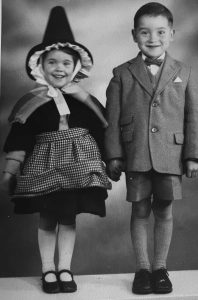
The girls wore a red dress with a grey checked apron, a shawl and the outfit was finished off with a headdress, which was made up of a (not easily worn) black top hat with lace night cap combo, accessorised with a pinned-on daffodil just in case anyone was unsure we were Welsh. The boys were dressed in their usual clothes, but instead of a daffodil had, and the bigger the better, an uncooked leek pinned to their jumper or coat. (St David’s monks lived off water and leeks – for more about St David see below.)
There were no lessons on St David’s Day; instead we all congregated in the hall for our school equivalent of the Eisteddfod which is an event celebrating the culture and language of Wales. We’d been learning our poems, dances and songs since the previous performance a year ago, but being on stage and staring at 100’s of tall ‘black traffic cones’ often resulted in stage fright so performances were regularly flaky!
The main problem with the morning was that, as primary school children, we’d all learnt the same thing, so after an hour, boredom had really set in. The boys would start eating their leeks and the girls would twitch and turn, trying to get one of the boys to share a bit of their oniony fare. The next child or group would be called to the stage, where it seemed the more you flailed your arms and spat the words at the audience, the greater the score you got. After just 2 hours, the smell of leeks had started to cause the younger children to faint – or perhaps that was their creative way of leaving – and caused the teachers to check their watches every 5 minutes to make sure they were still working. And yet the main excitement was still to come – the national anthem followed by a half-day holiday. I always thought this was to celebrate the tradition of St David, but I now think it was because the leek fumes had reached near fatal levels.
So, imagine my shock when moving to England in January, aged 10, when I discovered that not only did they not have a half day on the 1st March (I naively assumed traditions were global and the whole world was doing the same as Wales), but on their patron saint’s day, we did nothing! No poems to learn, no prancing around, no dressing up, no eating of a raw vegetable, no half day . . . no tradition. Suddenly, I missed the event of getting costumes down from the attic, the daffodil and leek pinning (my dear brother still has the scar from the heavily thrusted nappy pin), the excitement of getting dressed up and the soon-to-be holiday time.
The importance of traditions were now clear to me. And then it hit me . . . oh no . . . what if the English didn’t do Christmas?!
St David was born sometime between 462 and 515 AD, to Non and Sant, the Prince of Powys. He was actually named Dewidd, or Dewi to the locals, but was baptised David. Educated at a monastery, he became a missionary, spreading Christianity. He was a renowned preacher, founding monastic settlements and churches in Wales, Brittany and south-west England. He visited Glastonbury to rededicate the abbey and donated a travelling altar that included a great sapphire which was unfortunately stolen about 1,000 years later. He and his monks led a very simple and austere life, living off only leeks and water. They even refused to use oxen to plough their fields, preferring to do it by hand. His last words to his followers came from a sermon he gave on the previous Sunday: 'Be joyful, keep the faith, and do the little things that you have heard and seen me do.' The phrase 'Gwnewch y pethau bychain' - 'Do the little things' - is still well-known in Wales. He apparently lived for more than 100 years and died on 1st March 589 - hence St David's Day.
By Helen Stephens March 2022
 Australia
Australia  Ireland
Ireland  USA
USA  France
France 






